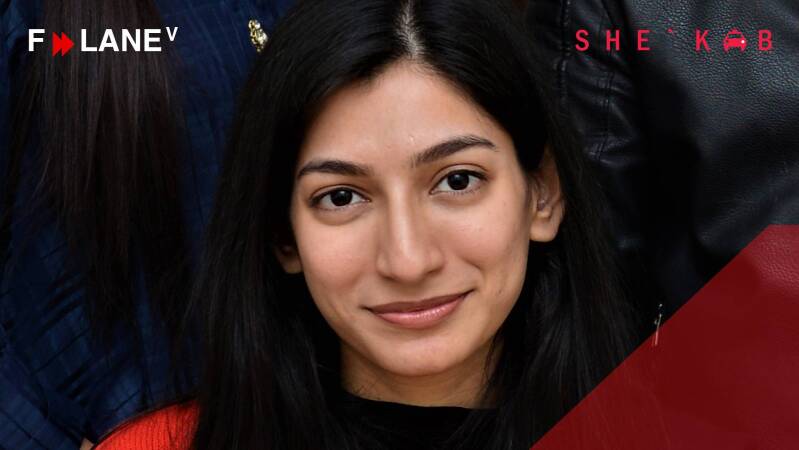Hira Batool Rizvi is the founder of She’Kab, a technology platform that connects registered riders to a pool of trusted drivers who provide shared-monthly transportation services to female passengers. Her mission is to provide hassle-free transportation services so women and girls can step out of their houses and realize their true potential. We spoke to Hira about how she came up with the idea for She’Kab, her biggest challenges, and her long-term vision for her company.
What drove you to the foundation of your company?
“When I got my first full-time job in my home country of Pakistan, I instantly saw a problem. 17 million Pakistani women were struggling due to the non-existent and unsafe public transport solutions available to them.”
Can you explain a bit more what the problems are that you try to solve with She’Kab?

“Public transportation is a huge concern for women in the country. One out of every two women who use public transport face harassment. Taxis are higher priced and this results in our women either quitting their work completely or resorting to safer ways to travel, spending four times longer in transit than men.
We are changing this – with She’Kab! It is a subscription-based carpool service for working women in Pakistan. She’Kab is safe, reliable and four times more affordable than anything else in the market today! A subscription fee is 15 to 75 dollars per month where the rider can call a car two times a day for 20 or 24 working days a month.”
What are the main values that She’Kab stands for?
“With She’Kab we are making abstracts like freedom, independence, and having a choice real for women in Pakistan. Our one simple mission is to simply transform how women travel in Pakistan and beyond. We are doing this by using technology!”
What inspired you to be an entrepreneur?
“While I had grown up in a comfortable home with cars and drivers, I realized that most women and girls at my workplace were always worried about their daily commute. I knew that public transport was a huge concern for women in the country. There is one seat available for women – right next to the driver, as opposed to all the seats in the back allocated for men in public vans, but even then, one out of every two women using public transport report harassment. Working as an engineer, I was always frustrated at the lack of women in tech and the problem of transportation made it worse for us women. Next, I moved to the US for graduate studies and saw up-close the success of companies like Uber, Airbnb, and Lyft. This inspired me to think about ways I could apply the same principles of sharing economy and tech to solve the transport problem for women back in Pakistan. Seeing a booming smart-phone and internet penetration at home, I knew technology was the answer, but I also wanted to be mindful of creating a solution that was culturally and religiously appropriate for a conservative country like Pakistan, and a solution that generated revenue.
I returned to Pakistan and launched Pakistan’s first of its kind tech-enabled carpool service for women in 2015. SheKab has not only made life easier and safer for Pakistani women, but real-world friendships are formed inside every carpool ride to work. More importantly, SheKab is playing its role in economically empowering male and female drivers who share rides and earn roughly USD 400 per month driving for as little as one hour per day with us. We are also proud to say that our model is helping lower emissions significantly, by reducing the number of cars on the roads.”
What has been the biggest challenge you’ve faced?
“The challenges that we have faced in the course of our SheKab journey keep changing and prove to be our biggest learning experiences. Our challenges have sometimes been breaking stereotypes doing what we wanted, while at others they have been the obstacles that limit entrepreneurs to work in Pakistan. So far, one of our biggest obstacles has been dealing with the regulatory bodies in Pakistan and bringing in foreign investors as partners for a business established in Pakistan. This was happening at a time when our personal savings were dwindling, and we needed support to keep operations running.

Moreover, our inability to serve all incoming customers was also another one of the major struggles that we had to overcome. We were a small team and were managing most of our work with excel sheets and google maps. This led to us losing customers or putting them on wait-lists until we could process their requests. We overcame this with our internally designed smartphone application, which made our processes much smoother than before. However, we think there is currently a lot of room to improve our application, to make our end product easy to use and more efficient than it is today.”
Where do you see your company in 5 years from now?
“We are now able to process and convert customers into subscribed riders much more efficiently, and easily. Hence, our aim for the coming months is to move beyond the four cities that we are currently operating in, and cater to the customer base in other cities of Pakistan, and also explore opportunities for growth in the Middle East. To do this, we would need help improving our product, along with marketing, growth hacking, fundraising, and a deeper understanding of scaling, to realize the true potential of our idea.”
